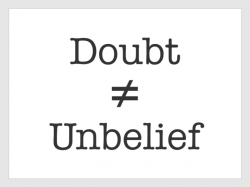"Blind Faith"
This article is one in a series of studies on the reasoning and the Message - you are currently on the page that is in bold:
- Blind Faith
- Anti-intellectualism in the Message
- Logic and the Message
- Reason and Faith
- Reason and the Message
- How to Deal with Doubt


Some message believers look at the evidence of Failed Prophecies that we and others have presented and state "You just don't believe" and then advocate a kind of "blind faith" that requires true believers to ignore any negative evidence.
Isn't blind faith good?
Message believers are hesitant to embrace an evidential faith. They think faith that requires evidential support as weak and inferior, while blind faith (a faith that simply trusts without question) is the truest, most sincere, and most valuable form of faith that we can offer God.
When Jesus presented Himself to Thomas, He made an important statement that is occasionally offered as an affirmation of some form of “blind faith”:
- After eight days His disciples were again inside, and Thomas with them. Jesus came, the doors having been shut, and stood in their midst and said, “Peace be with you.” Then He said to Thomas, “Reach here with your finger, and see My hands; and reach here your hand and put it into My side; and do not be unbelieving, but believing.” Thomas answered and said to Him, “My Lord and my God!” Jesus said to him, “Because you have seen Me, have you believed? Blessed are they who did not see, and yet believed.” (John 20:26-29)
Without any other context to understand what Jesus believed about the relationship between evidence and faith, this single sentence (“Blessed are they who did not see, and yet believed”) does sound like an endorsement of faith independent of evidential support. But context changes everything. Like other declarations offered by Jesus, this statement has to be reconciled with everything else Jesus said and did before we can truly understand what He believed about the role of evidence.
Yet Jesus also seemed to have a high regard for evidence. In John 14:11, He told those watching Him to examine “the evidence of the miracles” if they did not believe what He said about His identity. Even after the resurrection, Jesus stayed with His disciples for an additional forty days and provided them with “many convincing proofs” that He was resurrected and was who He claimed to be (Acts 1:2–3). Jesus understood the role and value of evidence and the importance of developing an evidential faith. It’s time for all of us, as Christians, to develop a similarly reasonable faith.[1]
The Apostle John thought evidence was important
As it turns out, the Apostle John wrote more about Jesus’ evidential approach than any other Gospel author. According to John, Jesus repeatedly offered the evidence of His miracles to verify His identity and told His observers that this evidence was sufficient:
- “Believe Me when I say that I am in the Father and the Father is in me; or at least believe on the evidence of the miracles themselves.” (John 14:11)
- “If I do not do the works of My Father, do not believe Me; but if I do them, though you do not believe Me, believe the works, so that you may know and understand that the Father is in Me, and I in the Father.” (John 10:37-38)
- “…the works which the Father has given Me to accomplish, the very works that I do, testify about Me, that the Father has sent Me.” (John 5:36)
John frequently described Jesus as someone who offered the evidence of His miraculous power to demonstrate His Deity. In fact, the passage describing Thomas’ doubt is also an affirmation of an evidential faith, if it is read in its entirety:
- But Thomas, one of the twelve, called Didymus, was not with them when Jesus came. So the other disciples were saying to him, “We have seen the Lord!” But he said to them, “Unless I see in His hands the imprint of the nails, and put my finger into the place of the nails, and put my hand into His side, I will not believe.” After eight days His disciples were again inside, and Thomas with them. Jesus came, the doors having been shut, and stood in their midst and said, “Peace be with you.” Then He said to Thomas, “Reach here with your finger, and see My hands; and reach here your hand and put it into My side; and do not be unbelieving, but believing.” Thomas answered and said to Him, “My Lord and my God!” Jesus *said to him, “Because you have seen Me, have you believed? Blessed are they who did not see, and yet believed.” Therefore many other signs Jesus also performed in the presence of the disciples, which are not written in this book; but these have been written so that you may believe that Jesus is the Christ, the Son of God; and that believing you may have life in His name. (John 20:25-31)
John makes an important statement right after the line that is typically offered to “demonstrate” Jesus’ alleged affirmation of a non-evidential faith: “Therefore many other signs Jesus also performed in the presence of the disciples…”.
What? Blessed are those who did not see and yet believed, therefore many other signs Jesus also performed in the presence of the disciples? Do you see the contradiction here if Jesus was speaking against evidence? Why would Jesus continue to provide evidence if those who believe without evidence are supposed to be blessed?
The answer is found, once again, in the Gospel of John. In Jesus’ famous prayer to the Father, He prayed for unity and He carefully included those of us who would become Christians long after Jesus ascended into Heaven:
- “I do not ask on behalf of these (the disciples) alone, but for those also who believe in Me through their word; that they may all be one; even as You, Father, are in Me and I in You, that they also may be in Us, so that the world may believe that You sent Me.” (John 17:20-21)
Jesus is talking here about all the people (like you and me) who will believe in Jesus not because of what we will see with our own eyes but because of what the disciples saw and recorded as eyewitnesses (“their word”). Yes, Thomas was blessed to believe on the basis of what he saw, but how much more blessed are those who will someday believe, not on the basis of what they will see, but on the basis of what the disciples saw and faithfully recorded.
Luke thought evidence was important as well
- So many others have tried their hand at putting together a story of the wonderful harvest of Scripture and history that took place among us, using reports handed down by the original eyewitnesses who served this Word with their very lives. Since I have investigated all the reports in close detail, starting from the story’s beginning, I decided to write it all out for you, most honorable Theophilus, so you can know beyond the shadow of a doubt the reliability of what you were taught.[2]
- Dear Theophilus: In my first book I wrote about all the things that Jesus did and taught from the time he began his work until the day he was taken up to heaven. Before he was taken up, he gave instructions by the power of the Holy Spirit to the men he had chosen as his apostles. For forty days after his death he appeared to them many times in ways that proved beyond doubt that he was alive... [3]
Luke's testimony shows that Jesus clearly understood the value of evidence and continually provided “many convincing proofs” (Acts 1:2-3) to His followers so they could record their observations and change the world with their testimony. Jesus commended this process. His words to Thomas were not an affirmation of “blind faith”[4]
Footnotes
- ↑ J. Warner Wallace, Cold-Case Christianity: A Homicide Detective Investigates the Claims of the Gospels (Colorado Springs, CO: DavidCCook, 2013).
- ↑ Luke 1:1-4 The Message Bible
- ↑ Acts 1:1-3 Good News Translation (GNT)
- ↑ Parts of this article were adapted from an email by J. Warner Wallace, the author of Cold-Case Christianity - Stand to Reason